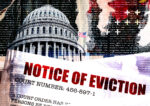Trending
Real estate remains largely silent on Trump’s Charlottesville stance, even as Big Business slams him
REBNY blasts POTUS’ statements as being “flat-out wrong and reprehensible.”
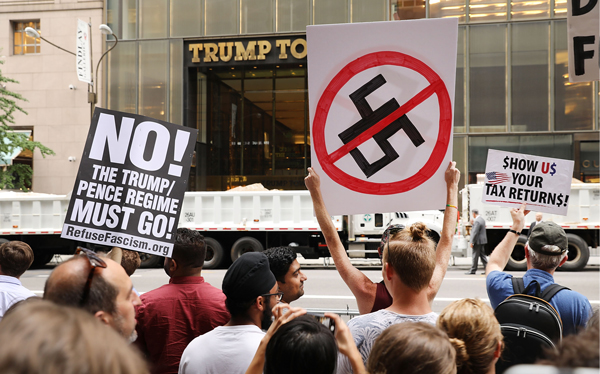
UPDATED, 12: 29 a.m., August 18: After President Trump blamed “many sides” for the eruption of white supremacist and neo-Nazi violence in Charlottesville, Virginia, the titans of industry who sat on his business advisory councils began to act. The chief executive of Merck stepped down from one of the groups Monday, and after Tuesday’s press conference at Trump Tower, others followed. By Wednesday, the councils had evaporated, and business leaders from across the country were slamming Trump for his remarks. The industry that gave rise to Trump, however, has been comparatively silent, despite its outsized involvement in Jewish causes.
Take a look at almost any prominent Jewish organization in the country, and you’ll see real estate’s imprint all over it. Howard Lorber is the chairman of the United States Holocaust Memorial Museum. Steve Roth endowed the Roth Center for Jewish Life at Dartmouth, and Simon Ziff did the same for the Ackman & Ziff Family Genealogical Institute at the Center for Jewish History. The Anti-Defamation League has a real estate division, stacked with names such as Jeff Gural, Burt Resnick and Joanne Podell, as does B’nai B’rith. Young Jewish Professionals’ list of mentors includes the likes of Charles Cohen, Joe Cayre and Stephen Ross. Real estate players are also major donors to these organizations, many of which share the goal of confronting anti-Semitism.
On Saturday, in his remarks condemning the violence in Charlottesville, Trump did not single out white nationalists or neo-Nazis, who had chanted slogans such as “Jews will not replace us.” On Monday, he called out neo-Nazis, the K.K.K. and other hate groups who “cause violence” in the name of racism. On Tuesday, however, he doubled down on his initial response, saying that “you had a group on one side that was bad. You had a group on the other side that was also very violent.”
Top business leaders, including the heads of General Electric and Apple, slammed Trump for equivocating. Real estate leaders, by contrast, have largely stayed mum. In an attempt to take the temperature of the industry, The Real Deal reached out to over 50 leaders of development firms, commercial and residential brokerages and public real estate investment trusts. Overwhelmingly, they either declined to comment or did not respond to requests for comment. Those who did, for the most part, offered up a more general denunciation of racism and bigotry but shied away from addressing the president’s comments.
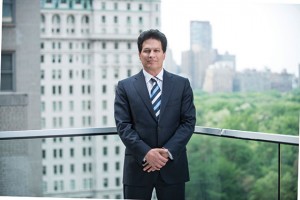
Ziel Feldman
Developer and Trump donor Ziel Feldman would not say anything specifically about the president. Instead, in a statement, he denounced “hate, racism, bigotry and violence.” Shimon Shkury, the head of Ariel Property Advisors who has served on the board of the Israeli American Council, said: “Clearly I stand with Israel and the Jewish people. I’m also happy to provide comments about real estate emerging trends but not on politics at this time.” Jerry Hollo, of Florida East Coast Realty, whose father Tibor is a Holocaust survivor, said “we can’t condone any support of neo-Nazis or the alt-right.”
Those who didn’t comment at all include some of the real estate bigwigs closest to the president: Vornado Realty Trust’s Roth, LeFrak Organization’s Richard LeFrak and Vector Group CEO and Douglas Elliman chair Lorber. Roth and LeFrak lead Trump’s council on infrastructure — which was just disbanded today – and Lorber was appointed chairman of the Holocaust museum by Trump.
The museum did put out a statement condemning the Charlottesville violence, but did not address Trump’s reaction directly. A former board member at the museum said that any statement would not have gone out without the approval of the chairman.
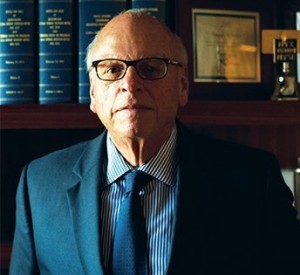
Howard Lorber
“I can’t imagine he [Lorber] wasn’t involved in that,” the board member said.
Several other big players stayed out of the fray, including Extell Development’s Gary Barnett, Related Companies’ Stephen Ross, Rudin Management’s Bill Rudin, Meridian Capital Group’s Ralph Herzka, Clipper Equity’s David Bistricer, Steve Witkoff, Silverstein Properties’ Larry Silverstein, RFR Realty’s Aby Rosen, Ackman Ziff’s Simon Ziff, and Howard Rubenstein, who’s counseled both Trump and his father Fred. Many representatives for these leaders said they were traveling and unreachable. Charlie Kushner, father to top White House adviser Jared Kushner and a major donor to Jewish causes, declined to comment.
Adam Leitman Bailey, an attorney who represents many prominent landlords, said the topic of Charlottesville and Trump’s reaction to it has not come up in his interactions with clients this week.
“I take this week as an example–right or wrong — that business comes first and Donald Trump’s conversations and tweets are not as important as the economy and these executives’ business matters,” he said.
I think it’s unbelievable that in 2017, Nazis and K.K.K. will march in the streets of the U.S. and the president says ‘both sides.’
Jeanne Zaino, a political science professor at Iona College, said many of the business executives who have denounced Trump so far have been linked to him in a very public way, through their affiliations with the presidential advisory councils.
“A lot of this is self-preservation,” Zaino said. “If you are publicly attached to him and you feel it could hurt your bottom line, it could hurt you with your board, it could hurt you with your clients, then you may publicly make a show of pulling out. When you’re not so publicly attached to him, I don’t think it hurts you so much individually to just keep under the radar.”
Tipping point
Given the general silence, the words of those who directly spoke out against the president’s remarks took on added significance. John Banks, the president of the Real Estate Board of New York, one of the city’s most powerful trade groups, blasted Trump, saying his “rhetoric in response to the recent white supremacist actions in Charlottesville was flat out wrong and reprehensible.”
“This is not about politics,” Banks added. “This is about decency and respect for the principles of equality that make our country what it is.”
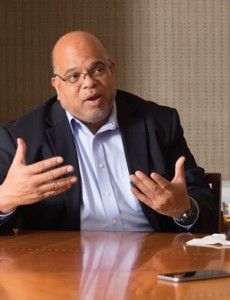
John Banks
Gerald Morganstern, a real estate attorney who is president of B’nai B’rith Real Estate of New York, urged Trump “to review his prior statements with his family and advisors and reconsider his position on these recent events.”
“He should not want or need the backing of the un-American groups spouting hatred and harm to others and should expressly state his disavowal of them,” Morganstern added.
Newmark Holdings’ Gural, who chairs the ADL’s real estate group, described Trump’s observations that there were “fine people on both sides” as “way off the mark.”
“I respect that [Trump] is not necessarily politically correct and says what he thinks,” Gural said. “I just think in this case, what he thinks doesn’t make sense, and hopefully does not represent his real feelings about anti-Semitism, although obviously his answer would be that he’s condemned neo-Nazis.
I take this week as an example–right or wrong — that business comes first and Donald Trump’s conversations and tweets are not as important as the economy and these executives’ business matters.
It’s no secret that real estate was an early and eager passenger on the Trump train. Industry figures began boosting Trump within weeks of his June 2015 announcement that he would seek the presidency. That summer, Charlie Kushner threw a fundraiser in Elberon, New Jersey, that was attended by several prominent members of New York’s Syrian Jewish real estate community. A year later, the likes of Tom Barrack, John Catsimatidis, Peter Kalikow, and others, including Roth, LeFrak and Lorber, would together pour millions of dollars into Trump-supporting political action committees.
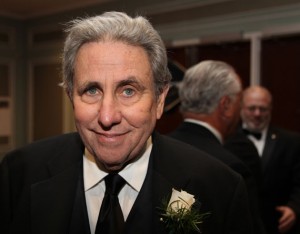
Jeff Gural
Real estate leaders have tended to look the other way when it comes to some of the Trump administration’s most controversial policies, including the proposed travel ban on citizens of seven Muslim-majority nations. But Trump’s remarks on Tuesday, made from the atrium of his beloved Trump Tower, have spurred many to speak up.
“I think it’s unbelievable that in 2017, Nazis and K.K.K. will march in the streets of the U.S. and the president says ‘both sides,’” said Danny Fishman, managing partner at Gaia Real Estate. “In a domestic conflict like this, the president should pick a side. He’s not the U.N. This president knows when he wants to pick a side. And in a place where he should have, he didn’t.”
Trump’s reference to both sides is “like saying Hitler’s sadistic violence is equivalent to the self-defense and hit and run tactics of underground Jewish partisans during World War II,” said Ken Kahan, president of development firm California Landmark Group, who also serves on the board of the Jewish Federation.
I think this is something being manipulated by the media.
Myra Nourmand, of L.A-based luxury brokerage Nourmand & Associates, said “Trump needs to take a stronger stand and not make excuses for them [neo-Nazis].”
Hall Willkie and Bess Freedman, who lead Brown Harris Stevens, said that Trump had “emboldened the darkest forces in our society and the consequences of that will be far-reaching.” David Kramer of Hudson Companies said that “given the Trump Organization’s discrimination against black tenants, the Obama birth certificate claim, and his calling Mexican immigrants rapists (we all could go on and on), his Charlottesville comments are just par for the course as far as I can tell.”
Robert Reffkin, CEO of Compass, said that “instead of getting comfort from the President of the United States, I became more fearful because I believe his reaction emboldens white supremacists and neo-Nazis. I want the leader of the United States to protect everybody. I don’t feel angry, I feel pretty scared – we’re beyond anger here.”
Some who’ve come out for favor for Trump in the past continued to bat for him. Gil Dezer, a die-hard Trump supporter and donor who developed the Trump condominium towers in Sunny Isles Beach, said “whatever is being said about Trump saying things against Judaism is extremely wrong.”
“I think this is something being manipulated by the media,” Dezer added. “I know the guy. He is not a white supremacist and he doesn’t hate Jews.”
Stephen Meister, a real estate attorney who’s worked with Trump, said the president was “fundamentally correct when he initially said there was blame on both sides.”

Gil Dezer
“To me,” Meister continued, “if a radical leftist who calls himself a counterprotester but is really a counter-rioter comes to a rally with a bat intending on assaulting a speaker because he doesn’t agree with ideology of the speaker, then that leftist is in the moral wrong.”
But others who’ve generally supported Trump went the other way on this issue. Ezra Katz, CEO of Aztec Group, a Miami-based real estate investment and financing firm, called the president’s remarks “ass-backwards.”
“It was a mistake not to first call out the Nazis and neo-fascists for what they are,” said Katz, who voted for Trump. “He belatedly made mention that he disagreed with the neo-Nazis, but it was lost already by then.”
Gural said that he had heard from Jewish friends who were Trump supporters but had renounced their support following Tuesday’s remarks.
“The fact is,” he added, “that I don’t think this would ever have happened if we had a different president.”
Clarification: This story was updated to clarify the roles of the Jewish organizations mentioned in the story.



